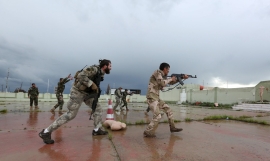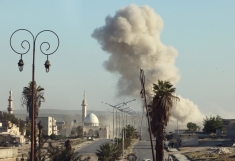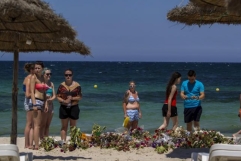
The Chaldean Patriarchate has condemned the destruction of the historic Clock Church by the Islamic State (ISIS), saying it was undertaken "to erase Iraq's Christian memory in favour of a state of strangers who commit terror in the name of Islam."
The iconic Clock Church, a Christian church known for its soaring clock tower which was built in the 1870s, is one of the best known remaining churches in Mosul, Iraq, which was named after its tower and funded by Empress Eugenie, the wife of the last French Emperor Napoleon III.
The Chaldean Patriarchate urged the international and religious community to take serious steps to end the war in light of the new barbaric attacks on cultural symbols in Iraq.
"This targeting of the Christian Church is a grave sin against God and man," the Chaldean Patriarchate said, as quoted by Breitbart.
"International community and religious authorities must fully assume their responsibilities to protect the country and the lives of innocent citizens, to take serious steps to end the wars and conflicts and create the conditions for laying the foundations of just and comprehensive peace in Iraq," it added.
Pressure is mounting on ISIS militants in Mosul as Kurdish forces, joined by Iraqi government and Shia militia forces, are closing in to retake the city.
The Iraqi Christian community leader disclosed that the jihadists evacuated the surrounding area before looting the church and detonating planted explosives. They took all the artefacts they found valuable, reports say.
The church, historically known as the "Church of the Miraculous Madonna," was constructed in 1873 for Iraqi Christians. Empress Eugenie, the wife of Napoleon III, provided the funds for the construction of the church. She later added the clock tower in appreciation of the efforts made by the Dominican Fathers during a typhoid epidemic that started in 1879, according to historians.
Mosul fell into ISIS hands in June 2014. The jihadists had strengthened their hold across many regions in the city before Iraqi and Kurdish forces, supported by coalition airstrikes, launched attacks this year with the aim of retaking the city.
Aljazeera reports that there were around 45 churches in the city, but most of them have already been destroyed by the militants while some have been turned into jail houses and courts.
Sister Luigina Sako, superior of the house in Rome of the Chaldean Sisters of the Daughters of Mary, said the Clock Church been a symbol of their youth and that even Muslims living in the city knew and honoured the Church of Miraculous Madonna.
"The bells of that clock chimed in our youth, when Mosul was a city where you lived in peace," Sister Sako said.

















